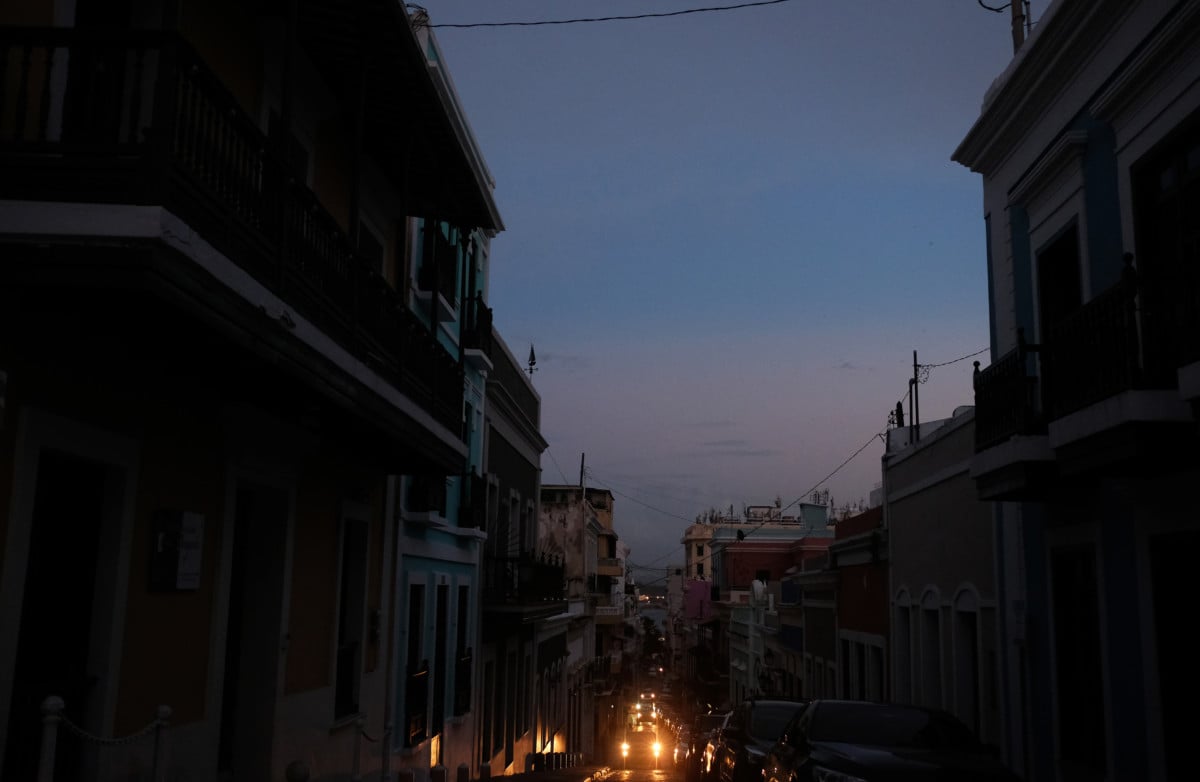After struggling for nearly seven months to rebuild Puerto Rico’s power grid, which was destroyed by Hurricane Maria, the US territory experienced an island-wide blackout on Wednesday — its first since the storm struck last September.
As meteorologist Eric Holthaus put it, “This is still a humanitarian emergency.”
Puerto Rico, Day 210:
—The entire island (>3,000,000 people) is w/o power for the first time since Hurricane Maria struck
—More than 10k people still w/o clean water, >100k continuously w/o power since the hurricane
—This is still a humanitarian emergencyhttps://t.co/0Nxwh48Tlj— Eric Holthaus (@EricHolthaus) April 18, 2018
Officials told The Associated Press that “an excavator accidentally downed a transmission line” and “it could take 24 to 36 hours to fully restore power to more than 1.4 million customers.” The blackout is just the latest in a series of power outages that residents have endured since the storm hit, including one last week that left about 840,000 people in the dark.
Responding to the incident on Twitter, Rep. Keith Ellison (D-Minn.) targeted the Trump administration’s recovery efforts post-Maria — which have been widely denounced as inadequate — while Sen. Bernie Sanders (I-Vt.) called for a broader government investment to repair the island’s power system.
It’s shameful, and a total failure of governance by the Trump White House, that the people of Puerto Rico are still dealing with an unstable and unreliable power grid almost 7 months after Hurricane Maria. https://t.co/SUxjYWFBPS
— Rep. Keith Ellison (@keithellison) April 18, 2018
We are the wealthiest country in the world. Our full resources must be brought to fix not just this blackout, but the ongoing outages that have left hundreds of thousands of Puerto Ricans without power since Hurricane Maria.https://t.co/uax2XJoHGu
— Bernie Sanders (@SenSanders) April 18, 2018
Sanders is among those who have advocated for rebuilding the grid to rely on renewable forms of energy as well as sweeping loan forgiveness for Puerto Rico Electric Power Authority (PREPA), which even before the storm was plagued by outdated infrastructure and massive amounts of debt.
Wednesday’s blackout, as the AP noted, “occurred as Puerto Rico legislators debate a bill that would privatize the island’s power company, which is $14 billion in debt and relies on infrastructure nearly three times older than the industry average.”
The privatization plan, announced by the governor earlier this year, has been met with contempt among local leaders and residents.
Writing for The Intercept last month, Naomi Klein explained that based on Puerto Ricans’ past experiences with private telephone companies and water treatment systems, many fear “that if PREPA is privatized, the Puerto Rican government will lose an important source of revenue, while getting stiffed with the utility’s multibillion-dollar debt.”
“They also fear that electricity rates will stay high,” she wrote, “and that poor and remote regions where people are less able to pay could well lose access to the grid altogether.”
The privatization fears are accompanied by critiques of controversial repair work by government contractors such as Whitefish and Fluor following the hurricane.
The people of #PuertoRico are in the dark again. They deserve so much better than this. And no accountability for contractors like Fluor, which was paid $830-million to “rebuild” the grid. They’ve already returned to Texas… https://t.co/uzzXyOFzST
— Naomi Klein (@NaomiAKlein) April 18, 2018
Our most important fundraising appeal of the year
December is the most critical time of year for Truthout, because our nonprofit news is funded almost entirely by individual donations from readers like you. So before you navigate away, we ask that you take just a second to support Truthout with a tax-deductible donation.
This year is a little different. We are up against a far-reaching, wide-scale attack on press freedom coming from the Trump administration. 2025 was a year of frightening censorship, news industry corporate consolidation, and worsening financial conditions for progressive nonprofits across the board.
We can only resist Trump’s agenda by cultivating a strong base of support. The right-wing mediasphere is funded comfortably by billionaire owners and venture capitalist philanthropists. At Truthout, we have you.
We’ve set an ambitious target for our year-end campaign — a goal of $150,000 to keep up our fight against authoritarianism in 2026. Please take a meaningful action in this fight: make a one-time or monthly donation to Truthout before December 31. If you have the means, please dig deep.
